Key takeaways:
- Appreciative Inquiry (AI) shifts focus from problems to strengths, fostering creativity and collaboration among participants.
- Engaging techniques like storytelling, the World Café method, and appreciative questions help create a positive workshop culture.
- Encouraging feedback and structured reflection enhances participant engagement and inspires actionable insights.
- Collaborative tools and immersive experiences (like role-playing) deepen understanding and empathy, enriching group dynamics.
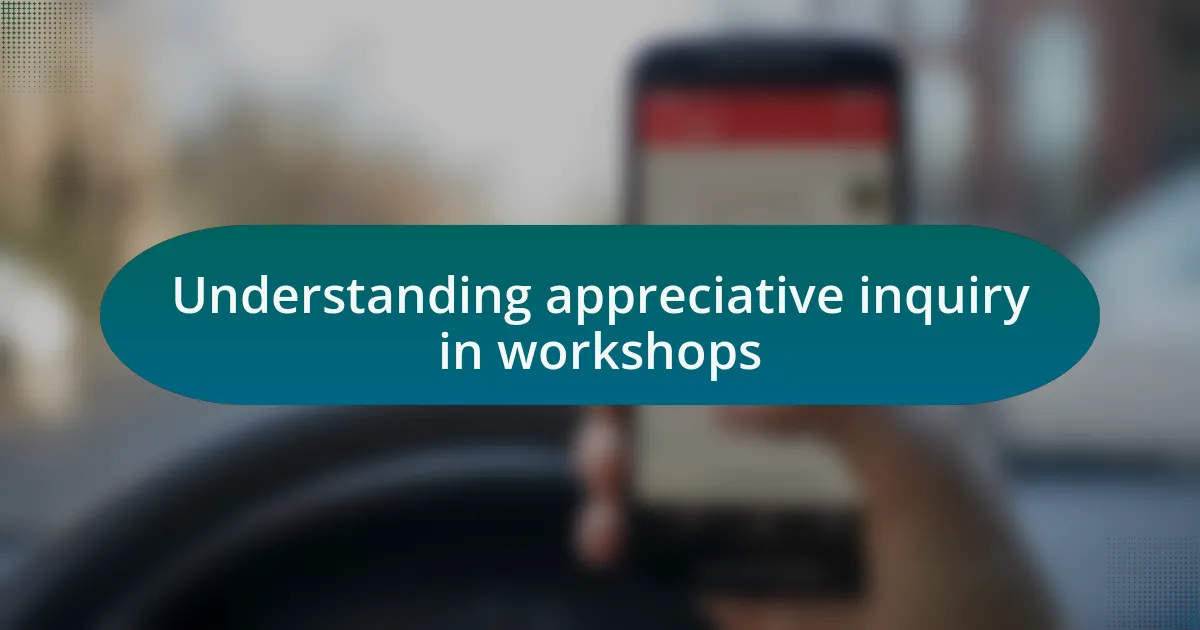
Understanding appreciative inquiry in workshops
Appreciative Inquiry (AI) is a transformative approach that focuses on identifying what works well in a group rather than solely addressing problems. I remember facilitating a workshop where participants were initially skeptical about this positive framework. However, as we began to uncover their strengths and successes, the atmosphere shifted; suddenly, there was a palpable sense of excitement. Have you ever noticed how people light up when they talk about their achievements? That’s the kind of energy AI taps into.
At its core, AI operates on the belief that discussions centered around strengths foster creativity and innovation. During one workshop, I observed a team brainstorming solutions to their challenges, and they continually bounced ideas off each other, drawing from their past successes. It was almost as if they were building a bridge from their achievements to new possibilities. What would happen if we consistently encouraged such dialogue in technology spaces?
Moreover, AI encourages a collaborative spirit among participants, making them feel valued and respected. In one instance, I had a team member who was usually quiet begin to share profound insights, catalyzed by others’ recognition of their expertise. This experience reinforced my belief: isn’t it incredible how a simple shift from problem-solving to celebrating strengths can ignite passion and drive collaboration?
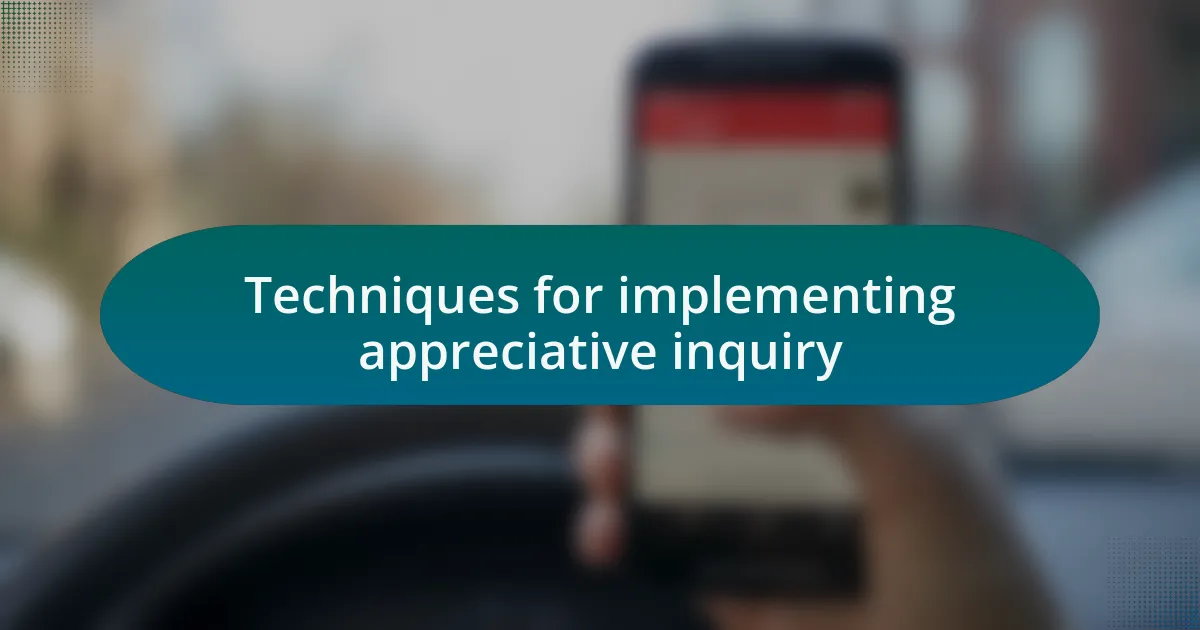
Techniques for implementing appreciative inquiry
To effectively implement appreciative inquiry in workshops, I often use storytelling as a technique. Sharing compelling narratives can elicit emotions and inspire participants to connect with their personal experiences. In one session, participants shared stories of when they felt proud of their contributions, and the energy in the room was electric. Isn’t it fascinating how a narrative can shift perspectives and open minds?
Another technique I incorporate is the “World Café” method, which encourages open dialogue in smaller groups. By rotating participants, I facilitate organic discussions that allow individuals to explore shared successes. I recall a time when a software team engaged in this format, leading to innovative ideas that they never would have exposed in a rigid setting. How often do we get caught up in formal structures that stifle creativity?
Finally, I always emphasize the power of appreciative questions. These are open-ended prompts that draw out strengths and possibilities. For instance, during a workshop, I asked participants, “What achievement are you most proud of this year?” The range of responses not only showcased their capabilities but also helped them recognize the potential for future success. I find that such questions cultivate a mindset focused on growth, don’t you agree?
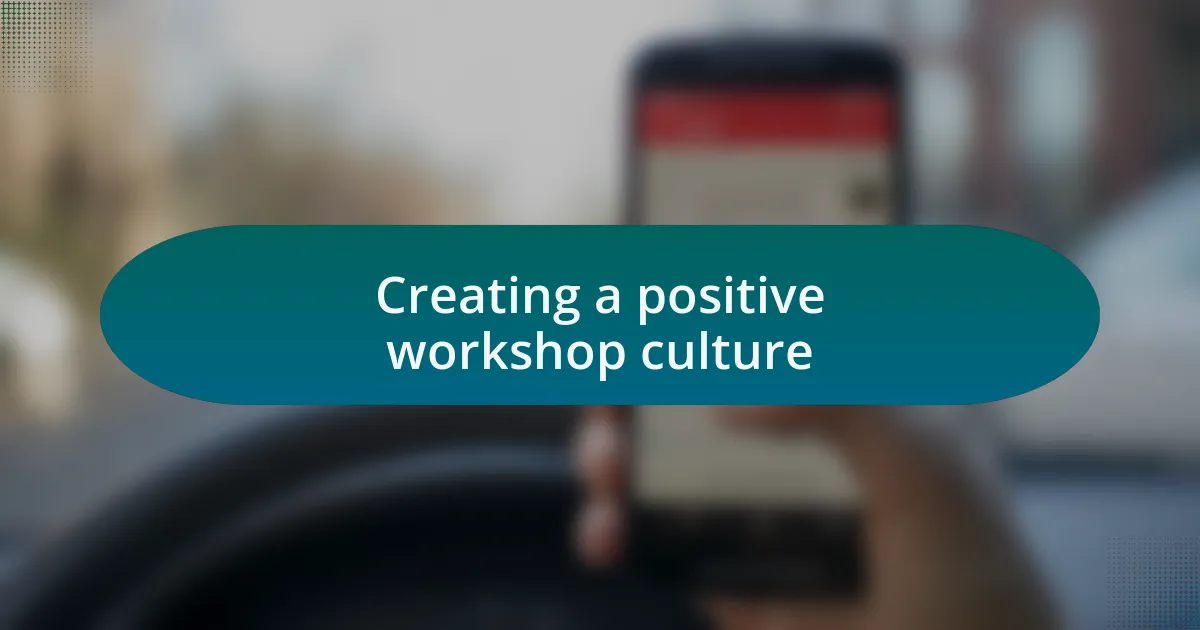
Creating a positive workshop culture
Creating a positive workshop culture starts with setting an inclusive tone from the very beginning. I usually open with an icebreaker that highlights participants’ strengths, allowing everyone to feel valued. I once led a session where we shared unique skills; it was incredible to see how quickly confidence built among participants. Isn’t it amazing how a simple gesture can nurture trust and camaraderie?
In my experience, celebrating small wins during workshops significantly enhances the overall atmosphere. I make it a point to pause and applaud any progress made, no matter how minor. There was a time when a participant shared a tentative idea, and I highlighted that as a step forward, which encouraged them to expand on it later. This practice fosters a sense of achievement that reinforces a positive environment, don’t you think?
Another technique I utilize is encouraging feedback at every stage. At the end of each session, I invite participants to share their thoughts on both the content and the experience. Once, a participant remarked that the environment felt unusually supportive, which prompted a conversation about how we can all maintain this positivity in our daily work. This kind of openness not only enriches our workshops but also cultivates a culture that thrives on shared success and collaboration.
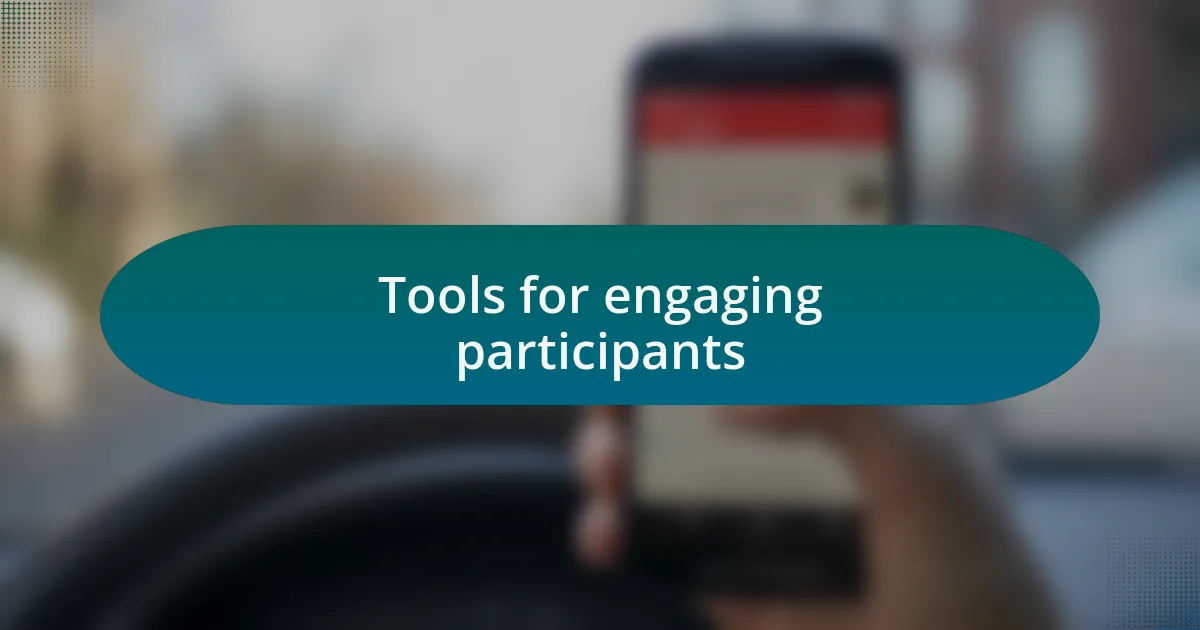
Tools for engaging participants
One of my go-to tools for engaging participants is the use of collaborative technology. I often incorporate platforms like Miro or Padlet, where everyone can contribute ideas in real-time. I remember a session where we collaborated on brainstorming solutions for a challenge; seeing everyone’s creativity come to life on the virtual board was exhilarating. It’s amazing how these tools can spark conversations that might not happen in a traditional setting.
I also find role-playing exercises to be incredibly effective for engagement. For instance, I once had participants step into the shoes of various stakeholders in a tech project, and the insights they shared were nothing short of eye-opening. This immersive experience not only deepens understanding but also generates empathy, making everyone more invested in each other’s ideas. Isn’t it powerful how stepping outside our own perspectives can pave the way for richer collaborations?
Another method I’ve discovered to maintain energy and focus is using quick, interactive polls. These serve not just to gauge opinions but also to keep everyone engaged actively. During one workshop, we voted on different project priorities, and it was fascinating to see how those discussions evolved afterward. It felt like everyone had a stake in the outcome, reinforcing their connection to the material and to one another. Don’t you agree that involvement is key to retaining interest?
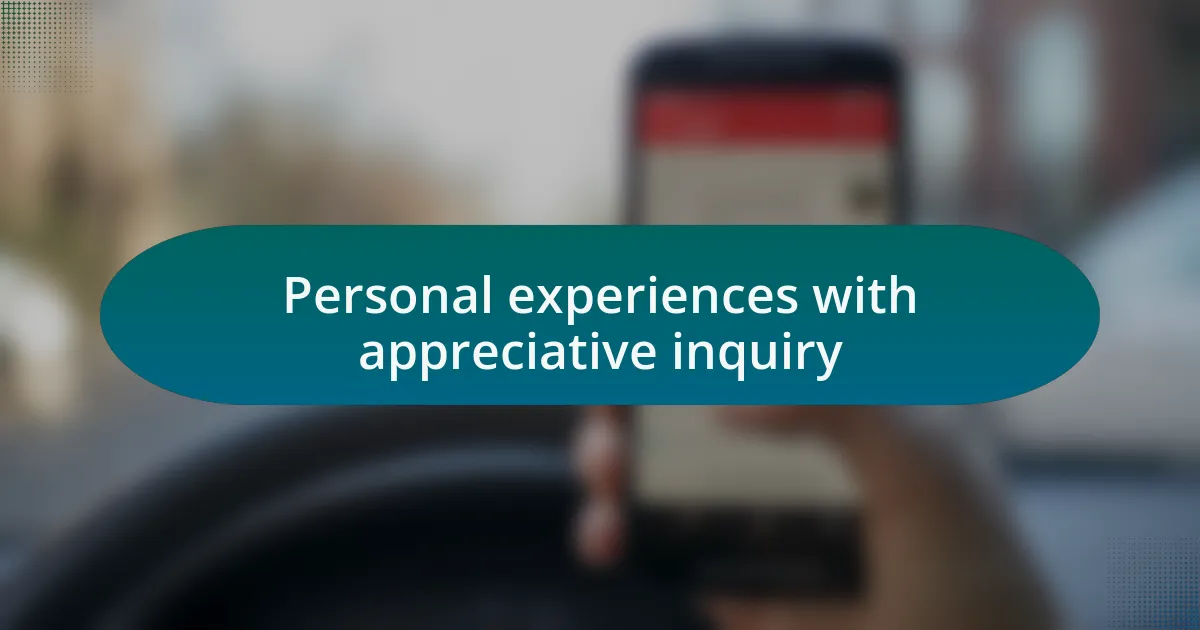
Personal experiences with appreciative inquiry
Whenever I facilitate workshops using appreciative inquiry, I notice a profound shift in the room’s energy. In one session, we focused on highlighting past successes instead of dwelling on challenges. Participants shared their proudest project moments, and I could see their faces light up as they recalled what worked well. It’s incredible how celebrating achievements can create a supportive atmosphere that encourages vulnerability and deeper connections among participants. Have you ever experienced how recalling positive moments can transform a group dynamic?
In another instance, I encouraged participants to ask open-ended questions rather than jumping straight into problem-solving. One participant posed a question about a technology they were unsure of, and the way the group rallied to share knowledge was truly memorable. I felt a sense of pride watching them build on each other’s ideas, fostering a collaborative spirit that I believe is essential in our fast-evolving tech industry. Isn’t it fascinating how a single question can create a ripple effect of learning?
I also find that when I share my own experience with appreciative inquiry, it resonates with participants. In a workshop where we aimed to develop a new application, I opened up about a project that failed mid-way but provided learning opportunities worth celebrating. Sharing that vulnerability helped others feel safe to voice their own setbacks and triumphs. It reinforced the idea that our failures can be just as valuable as our successes. Isn’t it refreshing to approach challenges from a perspective of growth?
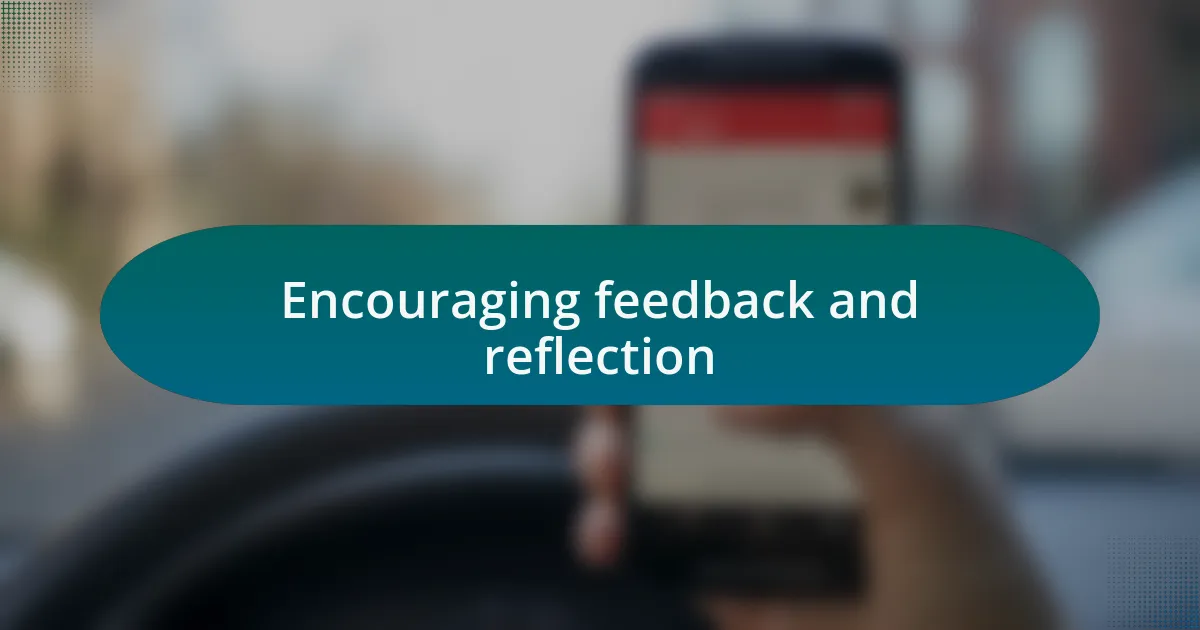
Encouraging feedback and reflection
In my workshops, I’ve found that dedicating time for structured reflection can radically enhance the learning experience. After each session, I implement a simple feedback mechanism where participants can jot down their thoughts. One memorable instance was when someone shared that a particular discussion sparked a new project idea. It was enlightening to see how reflection not only validates experiences but also inspires action. Doesn’t it make you wonder how often we miss those insights without effective reflection?
Additionally, I encourage participants to engage in peer feedback. In one session, a participant recounted how hearing a colleague’s perspective on a tech solution opened up a pathway they hadn’t considered before. This exchange shifted their approach and created a supportive environment where everyone felt empowered to contribute. Have you ever noticed how sharing different viewpoints can lead to a richer understanding?
I also emphasize the power of wrap-up discussions at the end of each workshop. One time, a participant expressed that they felt lighter after verbalizing their thoughts on challenges they faced while implementing new technologies. This shared reflection not only fostered connection but also built a sense of community, reinforcing that we are all in this together. Reflecting collectively—doesn’t that just amplify our learning?